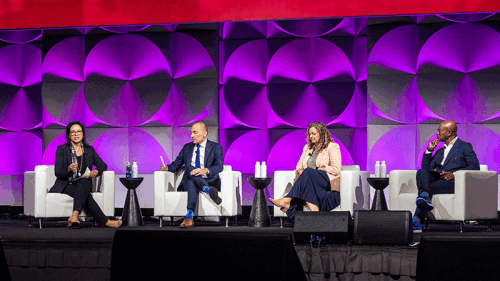More than 1,200 people attended the CRE Finance Council’s recent conference in Washington, D.C., titled “Commercial Lending: The New World Order.” They seemed to agree that commercial mortgage–backed securities (CMBS)—pools of real estate loans bundled and sold to investors—are back.
“We are seeing a lot of optimism in regard to the new-issue market,” said Lisa Pendergast, managing director of New York City-based Jefferies & Company and CRE Finance Council Chair. “We project $30 billion to $50 billion in new CMBS issues for 2011—way above the 2009 level of $3.5 billion, but not nearly 2007’s overheated peak of $243 billion.”
This is a sign that commercial real estate is recovering from the recession, say many analysts. “The CMBS market is a very important component of the overall debt capital market for commercial real estate,” said Richard A. McLemore, director of research and portfolio risk at MetLife Real Estate and Agricultural Investments in Morristown, New Jersey. “Its nascent recovery is a positive sign for our industry, as equity investors need a deeper and more diversified pool of potential financing sources and other lenders welcome the improved market liquidity.”
“The improvement we are seeing is due to increased credit availability and stabilizing on the property side, giving lenders more opportunity to lend,” explained Pendergast. “For much of 2010, we had a focus on core and core-plus assets, and now we are seeing valuation on those assets starting to improve, with cap rates falling to levels we would not have expected to see so soon after the crisis. Property investors are now reaching beyond those core markets to secondary markets and to B- and C-class assets. This indicates that recovery on the property side is broadening.”
Driven both by new regulatory scrutiny and by the market, the CMBS industry has entered a more “prudent lending environment” called “CMBS 2.0.” “We have improved transparency and disclosure,” Pendergast noted. “There are new ways to ensure that investors are comfortable in what they are investing in. Whereas most structured finance markets have thousands of assets and loans, most CMBS deals have just 15 to 75 loans each, and investors demand that you provide as much information as possible.”
The problem with CMBS is not the new 2.0 offerings, however; rather, it’s the securities issued in 2008 and earlier, said David Reiner, managing director of Grosvenor Investment Management US, Inc. “Over the next three years, billions of dollars’ worth of mortgages that were securitized in 2006–2008 will come to term, while property valuations have dropped from their peak and have not yet recovered. These properties will have to be sold, refinanced, or foreclosed. In many cases, to avoid foreclosure, owners refinancing their properties will have to come up with significant equity.”
“We are seeing 6 to 9 percent of all the mortgages in these securities referred to special servicing,” Reiner went on. “The special servicers can extend, restructure, or foreclose on loans. No one expects a cataclysmic meltdown like we saw with residential mortgages, but it could be a big problem.” This problem would be minimized, however, with an across-the-board economic recovery, he concluded.

